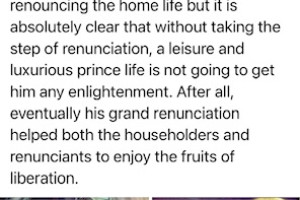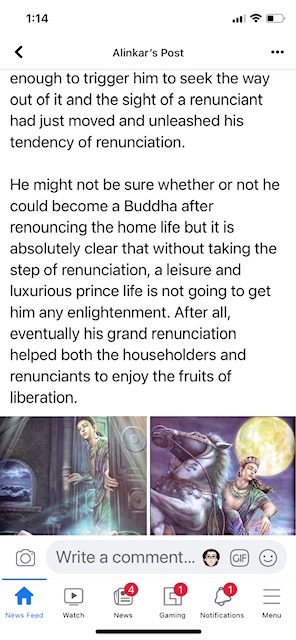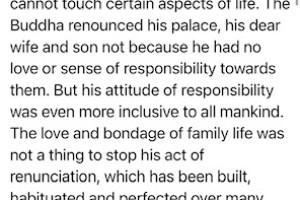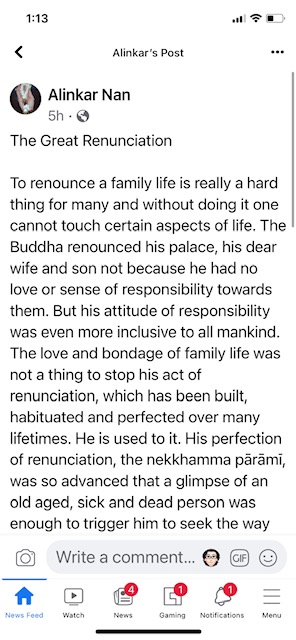The Buddha’s Renunciation Explained
This was posted in a Buddhist Facebook group by a Theravadin monk named Alinkar Nan. He gives a compassionate explanation of how and why the Buddha was able to walk away. All for the greater good.![]()


-
- · Michael Beloved
- ·
Alinkar Nan's explanation does not tally with what it says in the Pali cannon. Nan is giving a history revision to make excuses for Buddha's cruel behavior towards his family and later towards women who were left up due to the number of men who deserted their domestic responsibilities by runnning off to become monks. In addition there were the young men who left who in the future would have taken wives but who left that aside as well.
It would be better for someone to explain the cruelty by first explaining that he was cruel and then stating if it made sense in the long range. Nan's explanation cannot be accepted because it is not a fact, even Buddha himself when he explained what happened how he looked at the situation of his wife on the night when he left, practically boasted about his seeing the whole situation of domestic life as nothing but illusion. He said nothing about any enjoyment about the fruits of renunciation. He had no idea about that at the time. His act was a selfish cruel act even though when looking at it in retrospect, it makes some sense for someone to do that.
In contrast the way that Krishna told Arjuna was the way to stick it out in the domestic situation, even though Krishna told Uddhava to walk away from it and never look back. But Krishna taught Arjuna karmayoga or the application of yoga proficiency to domestic situation, rather than to leave it up abruptly as Buddha did.
I feel there is no necessity to sanitize Buddha's cruelty. Nature itself is cruel. Looking at nature as it is, one eventually understands that one has to act for one's personal benefit just as Buddha acted. At some stage, in some life, it comes down to that but still it is a cruel act nevertheless. Why drum up excuses for it.
One other thing I wish to add is that the average person cannot walk away with such total disregard. The average person has neither the insight nor willpower to do any such thing, even though superficially some people try to repeat his behavior.
The guy is a total exception. He is a shock person like witnessing a lightning strike at midnight. The brillance of it is wonderful but who can repeat it?
-
- · Marcia Beloved
- ·
There are so many young and old men who became monks during and since the time of Gautama Buddha. Who can do it? Many did it or are doing it and a few of these even become arahants in the modern day.
One thing that is missing in Krishna’s yoga and Patanjali’s as well, is the accounting of those who successfully practiced and became liberated. Where are those examples to follow? There are many stories of the complications of samsara and who was who and related to whom in previous lives and this becomes a highlight while confidence in the practice to yield success dwindles. That is just my opinion and can be taken with some shakes of salt.
Was the Buddha cruel? Did he even have a choice in the matter?
What about the cruelty of war and the many men who died and left their parents, wives and children to face the aftermath of the righteous Kurukshetra war?
I look forward to the time, in this life or some future existence when my practice bears the fruit of renunciation. Cruel or not, I’ll take the escape route then and not look back.-
Was the Buddha cruel? Did he even have a choice in the matter?
What about the cruelty of war and the many men who died and left their parents, wives and children to face the aftermath of the righteous Kurukshetra war?The declaration of his cruelty is not a criticism. It is a fact of what happened. Omitting it, does not help. Rationalizing it to make it palatable merely warps the story and gives incorrect impressions. One has to be cruel to be a successful ascetic because otherwise the involvement will be endless and it will consume one's effort-energy which means no success in the required austerities. No excuse is required about the cruel detachment of an ascetic but all the same, it is what it is.
Gautam Buddha himself got hassled by his father when someone complained that Buddha influenced young men to abandon domestic duties and the traditional way of life. That is evidence that his influence even caused emotional distress to parents of young men. There is pain in renunciation. Why avoid declaring that?
There is also pain in settling social matters the domestic way. Not just in Bhagavad Gita but in the Pali canon reports, there was war happening as a result of those who did not join Buddha and who lived in his vicinity. Chief warriors and others went to him for solutions about this. It happened there too. He advised some who took the posture of lay disciples, but who did not become monks.
Did he have a choice? There is indication in the report of his life, that the astrologers involved with his parents, who did rituals regarding his birth, spoke that he had two alternatives. One was to become a world conquering monarch and the other was to be a fully enlightened being who was matchless and infallible. As it manifested, he began his adult life as a Prince but then he switched to being an ascetic. But his decision to be an ascetic was circumstantial based on shock of some traumatic features which every creature is subjected to at some time.
Buddha made no attempt during his life to stop any of the feudal wars which happened where he lived in Nepal. Her did advise one group to behave in a certain way but besides that he made no effort to help anybody or to form any truce. Total detachment is a form of cruelty. It does not matter who does it and for renunciants no excuse is required for it. This is why what Alinkar Nan wrote was critically commented on by me.
An ascetic should be honest to know when his/her detachment is a cruel action. But even so, he/she may still proceed with the renunciation but with knowing that it is risky because of the blow back which may come. Buddha got some blow back from his father and from others in the clan in which he was born.
The war of the Kauravas resulted in untold suffering and Krishna did not sit under a tree to work out his liberation. Instead, he participated in the carnage by supervising one of the main warriors, Arjuna.
In both cases there was anguish, even though in Buddha’s situation there was no physical injury just the emotional type and the resentments felt by the families who lost their income and workforce because their sons, husbands and grandsons abandoned them.
-
- · Marcia Beloved
- ·
This monk, Ajahn Suchart, is from Thailand. He posts many question and answer sessions in English language on YouTube., He typically answers precisely.
At the 38.45 mark of this video link is a question and answer regarding renouncing the family to become a monk.
You may or may not agree with his response, but it certainly informs as to how Theravada Buddhists regard this.
-
I do not disagree with his explanation at 38.45. He may also go into an explanation about what happens to the resentment-sorrow energy which is expressed by those bereaving persons, as to where it goes and as to if the monk may be subjected to it.
The monk may have to process some or all of it. Even Gautam Buddha had to deal with some of this when elders from his birth county approached to complain when some young men left families to become monks.
Depending on the level of advancement of the monk, he/she may have to deal with this and the meditation may be negatively affected by those negative feelings emitted. In other words, the monk may be a target and may not be as advanced to avoid being wounded on the psychological plane. How is he/she to deal with this?
-
- · Suryananda
- ·
I find this to be a very important and advanced dialogue/ exchange. Lord Buddha's position is very special and totally unique! However, as a spiritual/religious figurehead the examples and principles he sets are of global consequences or repercussions.
It is undeniable that the presence of both mother and father is crucial and fundamental for humans young ones. This is also the case in some other species in nature. But as humans we have intelligence that can guide us, so we have a greater sense of responsibility and our karmic implications will be more consequential.
Due to Lord Buddha's lack insight and patience as well as sufficient foresight in waiting to conclude family life before retiring into absorption in the ultimate spiritual liberation, even today can be observed positions from his followers such as the one in the segment highlighted from the distinguished ajahn video presentation.
To flip this ethical/moral/religious/spiritual question on to the family members that would be left wanting, is ultimately superficial in consideration. That said his answer or explanations do not have to take into account a continuation or a prolongation of the practice of deep meditation even beyond the expiration of the physical body.
Kryia considerations are of a totally different order, because indeed and in a way, never mind the family members wallowing in their sorrow and selfish need for never ending burdensome association, the real concern is the repercussion of such a neglect in the future times of meditation, well beyond the present considerations.
Obviously, these aspects and complixities are presumably resolved in the case of the Lord, unfortunately, because the same may not be said of any regular follower, in this case immitation of a divine master can very well prove disastrous, since his teaching or example is flawed from a mere human perspective.
This distinction is of utmost importance, and the lack of it will remain problematic forevermore. It is not logical to labor for the ending of suffering as a solution of existence by imposinig the same upon others providentially placed in our care, or discharging the responsibility of their care onto others by default, when eternity can simply wait.







